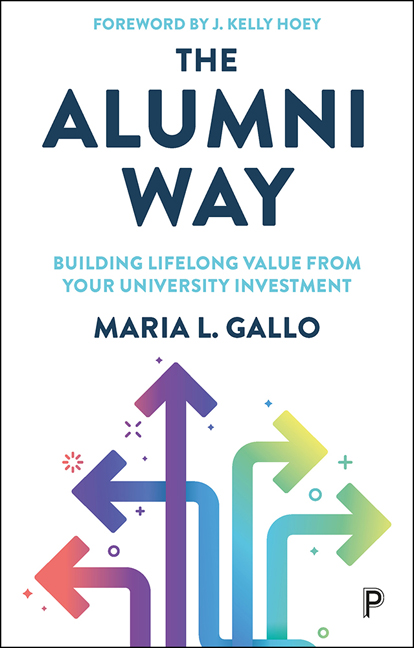Book contents
- Frontmatter
- Dedication
- Contents
- Acknowledgements
- Foreword
- Introduction: We are all alumni
- PART I Charting the course of the Alumni Way
- PART II The Alumni Way trait: Reflection
- PART III The Alumni Way trait: Curiosity
- PART IV The Alumni Way trait: Passion
- PART V The Alumni Way trait: Generosity
- PART VI Alumni: Bringing it into our lives
- Notes
- References
- About the author
- Index
8 - Our career, our alumni capital, and our curiosity
Published online by Cambridge University Press: 13 May 2022
- Frontmatter
- Dedication
- Contents
- Acknowledgements
- Foreword
- Introduction: We are all alumni
- PART I Charting the course of the Alumni Way
- PART II The Alumni Way trait: Reflection
- PART III The Alumni Way trait: Curiosity
- PART IV The Alumni Way trait: Passion
- PART V The Alumni Way trait: Generosity
- PART VI Alumni: Bringing it into our lives
- Notes
- References
- About the author
- Index
Summary
We all have those moments of serendipity. An informal chat that leads to a job interview. A career mentor from a chance meeting in the corridor. My key moment of serendipity was my job-shadowing placement during spring break. When I opened the envelope to reveal my placement, my heart sank. My assignment: the university's public affairs department, not a big downtown corporate. As a student who was ultra-involved in the campus community, it was a logical match for me. The serendipity from week-long placement led to so many of my lifelong connections. It was also the catalyst for my career in higher education advancement.
Serendipity is not the work of fairies. The phenomenon is what researchers call planned happenstance. A theory developed by psychologist John Krumboltz, planned happenstance is orchestrating events and opportunities for ourselves. This is also our ability to take strategic action once we are there. ‘Serendipity is not merely waiting for a fortuitous event to happen,’ Krumboltz explains, ‘Serendipity requires action on the part of the recipient – action to create favourable circumstances, action to recognize opportunities when they arise, and action to capitalize on unplanned events in a timely manner.’ This is more than being at the right place at the right time – or good luck. Planned happenstance is creating the conditions for serendipity. We put ourselves out there. We become visible. We are the conductors of our lives. We don't ‘meander through experiences initiated by others while passively awaiting a “knock on the door” ‘. This section examines how our alumni capital sparks our curiosity. A curiosity that allows us to create serendipitous moments in our professional lives.
To identify, build, and sustain our career, we need a curious mind. We recognize that healthy choices lead to peak physical fitness. For the mind, this exercise is curiosity. As educationalist John Dewey says of curiosity, we must be ‘constantly alert and exploring, seeking material for thought’. We can seek this nourishment through our alumni capital. ‘The truly curious will be increasingly in demand,’ says Ian Leslie, author of Curious: The Desire to Know and Why Our Future Depends on It.
- Type
- Chapter
- Information
- The Alumni WayBuilding Lifelong Value from your University Investment, pp. 65 - 68Publisher: Bristol University PressPrint publication year: 2021

